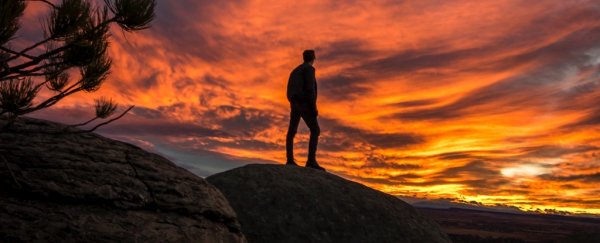Living at higher altitudes in the US may shape your psychology in strange ways, a new study reveals, showing a distinct link between living in elevated, mountainous regions and certain personality traits.
Not only that, but the kinds of traits mountain-dwellers demonstrate are quite specific, researchers say, rooted in the pioneer history of the Old West, and revealing residual psychological traces of the American frontier mindset and sensibilities.
"The harsh and remote environment of mountainous frontier regions historically attracted nonconformist settlers strongly motivated by a sense of freedom," says psychologist Friedrich Götz the University of Cambridge in the UK.
"These traits may have distilled over time into an individualism characterised by toughness and self-reliance that lies at the heart of the American frontier ethos."
To determine potential links between physical topography and human personality across the US, the researchers analysed data from the Gosling-Potter Internet Personality Project: a large-scale ongoing online survey of personality data, which began back in 1999, and was devised by members of Götz's team.
The test seeks to measure what are known as the 'Big Five' personality traits – openness to experience, conscientiousness, extroversion, agreeableness, and neuroticism.
Using the massive Gosling-Potter database, which millions of American volunteers have now contributed to, the researchers examined the links between over 3.3 million of the survey responses and the zip codes (US postal codes) of the respondents.
They found that people who lived in mountainous regions scored lower on agreeableness, extroversion, neuroticism, and conscientiousness, but higher on openness to experience – conforming with hypotheses proposing that the ecologically challenging conditions of mountain wilderness might attract and retain individuals with certain psychological predispositions, both back in the days of the Wild West, and now.
"Such rugged terrain likely favoured those who closely guarded their resources and distrusted strangers, as well as those who engaged in risky explorations to secure food and territory," Götz says.
"When we look at personality across the whole United States, we find that mountainous residents are more likely to have psychological characteristics indicative of this frontier mentality."
According to the data – gleaned entirely from people's own voluntary self-reports – residents of mountainous areas tend to be less trusting, caring, and forgiving than people from flatter areas, while being more rebellious, detached, and assertive.
The magnitude of the differences is overall quite small, the researchers acknowledge, but still significant, given complex psychological phenomena like a person's personality can be influenced by thousands of real-world factors, and physical topography is just one of them.
The researchers also think, despite the evidence for the frontier mindset in mountainous areas even now, the mountain environment of today is of course incredibly different to what it would have been like in actual frontier times, given the manifold advancements in transportation and technology, not to mention the effects of population growth. Even so, some of the old hardships seem to remain.
"These findings suggest that the mountains are still an isolating terrain with formidable barriers to many aspects of life and, even if humankind has managed to overcome them in many respects, they remain a defining element of one's physical surroundings that affects personality," the authors explain in their paper.
Which isn't to say that all mountains are necessarily equal in terms of their isolation and formidableness.
When the team compared mountain-dwellers from the eastern US to those of the western US, they found a number of differences, including that the relationship between mountainousness and openness to experience was 10 times higher in the west than in the east.
This, the team says, is evidence of other factors at play beyond mountainous topography, such as the sociocultural norms of frontier culture, which is found only in the west, not in the east.
Such cultural narratives, the researchers explain, are ultimately stronger in predicting personality than ecological features like mountains – no matter how awesome, challenging, or wild they may be.
The findings are reported in Nature Human Behaviour.
